New Updated 70-246 Exam Questions from PassLeader 70-246 PDF dumps! Welcome to download the newest PassLeader 70-246 VCE dumps: http://www.passleader.com/70-246.html (204 Q&As)
Keywords: 70-246 exam dumps, 70-246 exam questions, 70-246 VCE dumps, 70-246 PDF dumps, 70-246 practice tests, 70-246 study guide, 70-246 braindumps, Private Cloud Monitoring and Operations with System Center 2012 Exam
NEW QUESTION 183
You use System Center 2012 R2 Service Manager to manage incident requests. You need to create a service level objective (SLO). Which three items should you include in the SLO? Each correct answer presents part of the solution.
A. an email notification subscription
B. a queue
C. a calendar
D. an incident request template
E. a metric
F. an email notification template
Answer: BCE
Explanation:
In System Center 2012 ?Service Manager, you create a service level objective to create relationships between a queue and a service level, a calendar item and a time metric, and actions that occur before or after service level breaches. In order to create a service level objective, it is easier if you have already created or defined a calendar item and an SLA metric. Additionally, the service level objective that you create is linked to a queue.
Reference: How to Create a Service Level Objective
https://technet.microsoft.com/en-us/library/hh519603.aspx
NEW QUESTION 184
Hotspot Question
You manage a System Center 2012 R2 Operations Manager deployment. The deployment contains a server named Server1 that runs Windows Server 2012 R2. You discover an alert for Server1 generated by a monitor named Monitor1. Monitor1 does not implement on-demand detection. When you troubleshoot the cause of the alert, you discover that the issue causing the alert was resolved. You need to ensure that once you close the alert, an alert will be generated if the same issue reoccurs. What should you do before closing the alert? To answer, select the appropriate options in the answer area.
Answer:
Explanation:
Recalculate Health – this forces the monitor to recaclulate health, telling it not to wait until the next scheduled execution. State changes depending on the outcome of the health check. Using Health Explorer, you can reset the health state of an entity or recalculate the health of entity.
Incorrect answers:
Reset Health – if possible this will reset the monitor to healthy and close the alert. If the problem still exists the monitor will stay healthy until the next check. Only reset health for a monitor when you are sure that all issues have been resolved.
NEW QUESTION 185
Hotspot Question
You deploy System Center 2012 R2 Operations Manager to a server named Server1 that runs Windows Server 2012 R2. Your company has a public website that is hosted in Microsoft Internet Information Services (IIS). You need to use Operations Manager to monitor the availability of the public website from the United States, Europe, Asia, and Australia. What should you do on Server1? To answer, select the appropriate options in the answer area.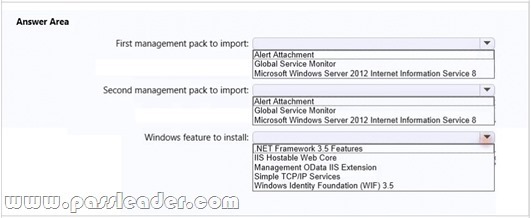
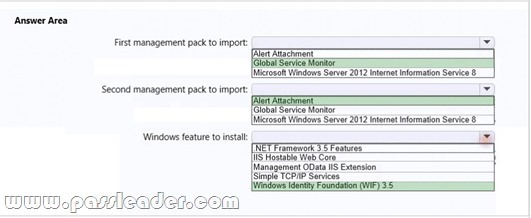
Explanation:
* Box 1, box 2: Run the GSM (Global Service Monitor) installer package from a machine which has System Center Operations Manager 2012 SP1: it will install GSM management packs. In order to receive full information regarding Visual Studio Web Test results, you need to import the Alert Attachment MP (available in the installation image for OpsMgr 2012 SP1) and enable file attachments for alerts.
* Box 3: Make sure Windows Identity Foundation is installed on your management server that is communicating with the cloud and everywhere the Operations Manager console is installed. Windows Identity Foundation is required.
Incorrect:
* Internet Information Services Hostable Web Core. This feature allows you to program an application to serve HTTP requests by using core IIS functionality.
* Simple TCP/IP Services supports the following TCP/IP services: Character Generator, Daytime, Discard, Echo and Quote of the Day. Simple TCP/IP Services is provided for backward compatibility and should not be installed unless it is required.
* Management OData IIS Extension
Management OData IIS Extension is a framework for easily exposing Windows PowerShell cmdlets through an ODATA-based web service that runs under IIS. to make the web service functional.
Reference: System Center Global Service Monitor: Getting Started
http://blogs.technet.com/b/momteam/archive/2013/01/14/system-center-global-service-monitor-getting-started.aspx
NEW QUESTION 186
Hotspot Question
You have a System Center 2012 R2 deployment that contains the servers configured as shown in the following table.
You deploy the Operations Manager agent to Server4. On Server1, you create a monitor and an alert view. You plan to create an automation workflow that will perform the following actions:
– Open an incident in Service Manager when Operations Manager raises an alert.
– After the incident is open, remediate the error that caused the alert.
– Resolve the alert.
– Close the incident.
You need to configure the System Center 2012 environment to support the implementation of the planned workflow. On which server should you perform each action? To answer, select the appropriate options in the answer area.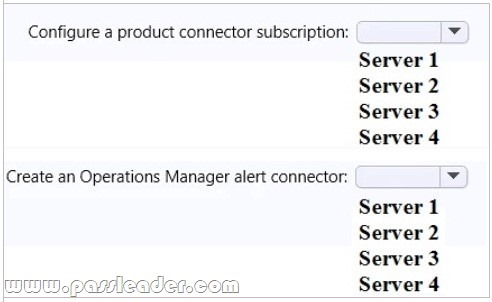
Answer: 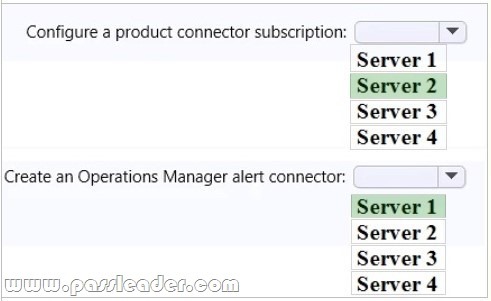
Explanation:
Reference: How to Create a System Center Operations Manager Connector
https://technet.microsoft.com/en-us/library/hh524325.aspx
NEW QUESTION 187
You manage a System Center 2012 R2 deployment that contains the servers configured as shown in the following table.
You have a Microsoft Azure subscription. All three servers have the Azure PowerShell module installed. You need to ensure that you can run Azure PowerShell cmdlets from Runbook Tester. What should you do?
A. From Server2, deploy the Integration Pack for Windows Azure to Server1.
B. On Server1, add the Run.NET Script activity. Add the Import-Module Azure cmdlet to the first line of the script.
C. On Server1, add the Run.NET Script activity. Invoke C:\Windows\System32\WindowsPowerShell\v1.0 \PowerShell.exe in the first line of the script.
D. From Server2, deploy the integration pack for Representational State Transfer (REST) to Server1.
Answer: D
Explanation:
The Integration Pack for Windows Azure is an add-on for Orchestrator in System Center 2012 Service Pack 1 (SP1) that enables you to automate Windows Azure operations related to certificates, deployments, cloud services, storage, and virtual machines using the ‘2012-03-01’ version of the Windows Azure Service Management REST API.
Reference: Windows Azure Integration Pack for Orchestrator in System Center 2012 SP1
https://technet.microsoft.com/en-us/library/JJ721956.aspx
NEW QUESTION 188
Your network contains a single Active Directory domain. The domain contains the servers configured as shown in the following table.
The domain contains a user account named Account1. You plan to implement an update baseline in VMM. From the Virtual Machine Manager console, you plan to add Server2 as an update server. VMM will use Account2 to manage WSUS. You need to identify the group to which you must add Account1 on Server2. The solution must use the principle of least privilege. Which group should you identify?
A. Administrators
B. Power Users
C. WSUS Administrators
D. Distributed COM Users
Answer: C
Explanation:
Grant users permissions for WSUS console access. If users do not have appropriate permissions for the WSUS console, they receive an “access denied” message when trying to access the WSUS console. You must be a member of the Administrators group or the WSUS Administrators group on the server on which WSUS is installed in order to use the WSUS console.
Reference: Cannot access the WSUS console
https://technet.microsoft.com/en-us/library/cc720470(v=ws.10).aspx
NEW QUESTION 189
Hotspot Question
You have a System Center 2012 R2 Configuration Manager deployment and a System Center 2012 R2 Virtual Machine Manager (VMM) deployment. All servers are Configuration Manager clients. You have a Windows Server Update Service (WSUS) server. Configuration Manager is configured to use WSUS for software updates. You need to implement a Windows Update deployment for all of the servers. The deployment must meet the following requirements:
– Hyper-V hosts must be excluded from receiving software updates from Configuration Manager.
– VMM must apply software updates to all of the Hyper-V hosts.
– VMM must obtain updates from the WSUS server.
– Administrative effort must be minimized.
Which actions should you perform in VMM and which actions should you perform in Configuration Manager? To answer, select the appropriate options in the answer area.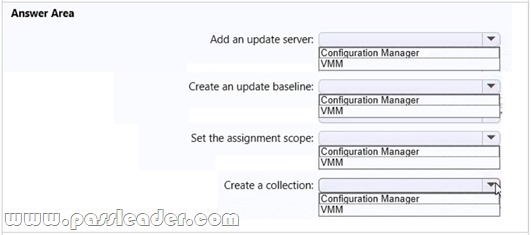
Answer: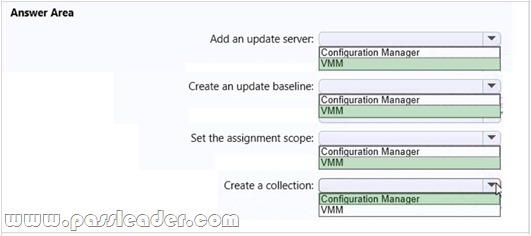
Explanation:
* To add a Windows Server Update Server to VMM
1. In the VMM console, open the Fabric workspace.
2. On the Home tab, in the Add group, click Add Resources, and then click Update Server.
The Add Windows Server Update Services Server dialog box opens.
* Baseline, assignment scope
VMM provides two sample built-in updates baselines that you can use to apply security updates and critical updates to the computers in your VMM environment. Before you can use a baseline, you must specify an assignment scope which contains the host groups, host clusters, individual managed computers, or (as of System Center 2012 R2) infrastructure servers that the baseline is applied to.
* Create collections in System Center 2012 Configuration Manager to represent logical groupings of users or devices.
Reference: How to Add an Update Server to VMM
https://technet.microsoft.com/en-us/library/gg675116.aspx
Reference: How to Configure Update Baselines in VMM
https://technet.microsoft.com/en-us/library/gg675110.aspx
NEW QUESTION 190
……
Download the newest PassLeader 70-246 dumps from passleader.com now! 100% Pass Guarantee!
70-246 PDF dumps & 70-246 VCE dumps: http://www.passleader.com/70-246.html (204 Q&As)